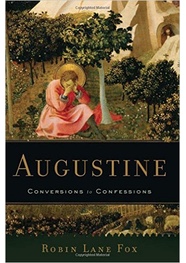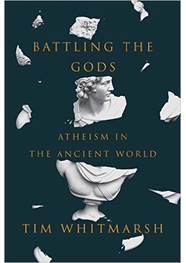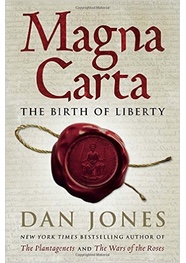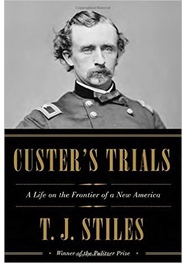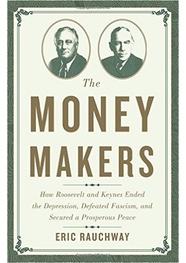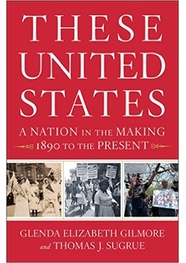NYT History Book Reviews: Who Got Noticed this Week?
Book: Augustine: Conversions to Confessions
Summary (Via Amazon): "Saint Augustine is one of the most influential figures in all of Christianity, yet his path to sainthood was by no means assured. Born in AD 354 to a pagan father and a Christian mother, Augustine spent the first thirty years of his life struggling to understand the nature of God and his world. He learned about Christianity as a child but was never baptized, choosing instead to immerse himself in the study of rhetoric, Manicheanism, and then Neoplatonism—all the while indulging in a life of lust and greed. In Augustine, historian Robin Lane Fox re-creates Augustine’s early life, showing how Augustine’s quest for knowledge and faith finally brought him to Christianity and a life of celibacy. Augustine’s Confessions, a vivid description of his journey toward conversion and baptism, still serves as a model of spirituality for Christians around the world."
Author: Robin Lane Fox is a British historian and an Emeritus Fellow of New College, Oxford
Reviewer: Mark Lilla is a political scientist, historian, and professor of humanities at Columbia University who has given the Carlyle Lectures at Oxford University.
Reviewer highlights
"He conjures the intellectual and social life of the late Roman Empire with an almost Proustian relish for detail. Augustine left behind dozens of books and hundreds of letters, all of which Fox seems to have consulted. He also provides vivid sketches of the saint’s friends, acquaintances, correspondents, patrons and spiritual enemies. Less might surely have been more. At points I had the sense of being in an American restaurant where each portion is large enough to feed an entire family. But Fox is such a good writer that interest never flags, and you always feel that 'you are there.'
"The most absorbing and rewarding chapters are those devoted to Augustine’s intellectual quest and, in particular, the ones about Manichaeism. Fox gives the clearest short exposition of Mani’s bizarre doctrines that I have ever read.
"...excellent book..."
Erik Moshe Comments:
Here's a quote from St. Augustine's Confessions which I particularly like: “I have known many men who wished to deceive, but none who wished to be deceived.”
In a letter to the editor, David Brahinsky, a professor of philosophy and religion, rebutted Lilla's claim that Robin Lane Fox is "rather obsessed with sex." He responded that "it was [Augustine] who was obsessed with sex, and Fox simply reports on this obsession. Augustine taught that the original sin was ‘concupiscence,’ which means something like sexual arousal, and that before the Fall the primal couple willed their sexual organs into readiness for sex, but that after it, they had to depend on the disgusting emotion of sexual arousal to ready their organs for intercourse."
Book: Battling the Gods: Atheism in the Ancient World
Summary (Via
Amazon):
"How new is atheism? Although adherents and opponents alike
today present it as an invention of the European Enlightenment, when
the forces of science and secularism broadly challenged those of
faith, disbelief in the gods, in fact, originated in a far more
remote past. In Battling
the Gods,
Tim Whitmarsh journeys into the ancient Mediterranean, a world almost
unimaginably different from our own, to recover the stories and
voices of those who first refused the divinities.
“Homer’s
epic poems of human striving, journeying, and passion were ancient
Greece’s only ‘sacred texts,’ but no ancient Greek thought
twice about questioning or mocking his stories of the gods. Priests
were functionaries rather than sources of moral or cosmological
wisdom. The absence of centralized religious authority made for an
extraordinary variety of perspectives on sacred matters, from the
devotional to the atheos,
or ‘godless.’ Whitmarsh explores this kaleidoscopic range of
ideas about the gods, focusing on the colorful individuals who
challenged their existence. Among these were some of the greatest
ancient poets and philosophers and writers, as well as the less well
known: Diagoras of Melos, perhaps the first self-professed atheist;
Democritus, the first materialist; Socrates, executed for rejecting
the gods of the Athenian state; Epicurus and his followers, who
thought gods could not intervene in human affairs; the brilliantly
mischievous satirist Lucian of Samosata.
“Before the
revolutions of late antiquity, which saw the scriptural religions of
Christianity and Islam enforced by imperial might, there were few
constraints on belief. Everything changed, however, in the millennium
between the appearance of the Homeric poems and Christianity’s
establishment as Rome’s state religion in the fourth century AD. As
successive Greco-Roman empires grew in size and complexity, and power
was increasingly concentrated in central capitals, states sought to
impose collective religious adherence, first to cults devoted to
individual rulers, and ultimately to monotheism. In this new world,
there was no room for outright disbelief: the label ‘atheist’ was
used now to demonize anyone who merely disagreed with the
orthodoxy—and so it would remain for centuries.
“As the
twenty-first century shapes up into a time of mass information, but
also, paradoxically, of collective amnesia concerning the tangled
histories of religions, Whitmarsh provides a bracing antidote to our
assumptions about the roots of freethinking. By shining a light on
atheism’s first thousand years, Battling
the Gods
offers a timely reminder that nonbelief has a wealth of tradition of
its own, and, indeed, its own heroes."
Author: Tim Whitmarsh is A.G. Leventis Professor of Greek Culture at the University of Cambridge. He recently wrote an article for HNN, The “New Atheism” Shtick.
Reviewer: Rebecca Newberger Goldstein is a novelist and philosopher. In September of 2015 she was awarded the National Humanities Medal by President Obama in a ceremony at the White House.
Reviewer highlights
“The major thesis of Tim Whitmarsh’s excellent Battling the Gods is that atheism — in all its nuanced varieties, even Morgenbesserian — isn’t a product of the modern age but rather reaches back to early Western intellectual tradition in the ancient Greek world.
“The period that Whitmarsh covers is roughly 1,000 years, during which the Greek-speaking population emerged from illiteracy and anomie, became organized into independent city-states that spawned a high-achieving culture, were absorbed into the Macedonian Empire and then into the Roman Empire, and finally became Christianized. These momentous political shifts are efficiently traced, with astute commentary on their reflection in religious attitudes.
“Whitmarsh argues convincingly that Greek religion functioned mainly as an expression of civic engagement, both at the local level of the city-states, each of which had its own favored divinities and rites, and at the broader level of greater Hellenicity.”
Erik Moshe Comments: Lightning never strikes in the same place twice, unless Zeus discovers where Richard Dawkins sleeps.
In a letter to the editor, Mary Lefkowitz wrote:
"Rebecca Goldstein, in her review of Whitmarsh’s book, declares that it is a myth and 'demonstrably false' to think that traditional religion 'soaked through to the Greek view of both the physical and moral spheres.' In support she quotes Whitmarsh: 'As a rule Greek religion had very little to say about morality and the nature of the world.'
“It’s certainly true that the ancient Greeks had no Bible and no Ten Commandments, and that they believed in many gods who broke all the rules by which modern monotheists suppose that a proper god ought to behave. But nonetheless traditional ancient Greek religion had its own brand of morality.
“In their epics and tragedies Greek poets describe a world in which most problems are caused by human beings who are unaware of the limitations of their own knowledge and who, even more to the point, do not realize that they are at the mercy of forces beyond their control — namely, the gods. Their religion encouraged questioning the gods and led to philosophical inquiry that Goldstein applauds. Indeed, without such continuing interrogation there would have been no Socrates or Plato, Epicurus or Lucretius — or indeed the kind of atheism that is practiced today."
Lefkowitz is the emerita Andrew W. Mellon professor in the humanities at Wellesley College, and the author of Greek Gods, Human Lives and Euripides and the Gods.
Book: Magna Carta: The Birth of Liberty
Summary (Via
Amazon):
“The Magna Carta is revered around the world as the founding
document of Western liberty. Its principles—even its language—can
be found in our Bill of Rights and in the Constitution. But what was
this strange document and how did it gain such legendary
status?
“Dan Jones takes us back to the turbulent year of
1215, when, beset by foreign crises and cornered by a growing
domestic rebellion, King John reluctantly agree to fix his seal to a
document that would change the course of history. At the time of its
creation the Magna Carta was just a peace treaty drafted by a group
of rebel barons who were tired of the king's high taxes, arbitrary
justice, and endless foreign wars. The fragile peace it established
would last only two months, but its principles have reverberated over
the centuries.
“Jones's narrative follows the story of the
Magna Carta's creation, its failure, and the war that subsequently
engulfed England, and charts the high points in its unexpected
afterlife. Reissued by King John's successors it protected the
Church, banned unlawful imprisonment, and set limits to the exercise
of royal power. It established the principle that taxation must be
tied to representation and paved the way for the creation of
Parliament.
“In 1776 American patriots, inspired by that
long-ago defiance, dared to pick up arms against another English king
and to demand even more far-reaching rights. We think of the
Declaration of Independence as our founding document but those who
drafted it had their eye on the Magna Carta.”
Author: Dan Jones is the NTY bestselling author of The Plantagenets: The Warrior Kings and Queens Who Made England, now a four-part BBC television miniseries, and The Wars of the Roses, which charts the story of the fall of the Plantagenet dynasty and the improbable rise of the Tudors.
Reviewer: Edmund Fawcett's latest book, Liberalism: The Life of An Idea, was recently reviewed by Walter G. Moss, a Contributing Editor of HNN.
Reviewer highlights
“...lively and excellent...
“Jones skirts political legend and sticks largely to what is known. He’s frank about unfilled documentary gaps and unsettled disputes of interpretation. Celebrants have made of Magna Carta a modern dawn, while deflationists have shrunk it to a passing incident. Jones avoids both extremes, aware that the story of this document has its own merits.”
Erik Moshe Comments: The Magna Carta is infantile and tasteless compared to the mighty MagnaDoodle. How would I know? Well, I'm drawing on a number of experiences.
Book: Custer's Trials: A Life on the Frontier of a New America
Summary (Via
Amazon):
“The key to understanding Custer, Stiles writes, is keeping in mind
that he lived on a frontier in time.
In
the Civil War, the West, and many areas overlooked in previous
biographies, Custer helped to create modern America, but he could
never adapt to it. He freed countless slaves yet rejected new civil
rights laws. He proved his heroism but missed the dark reality of war
for so many others. A talented combat leader, he struggled as a
manager
in
the West.
“He tried to make a fortune on Wall Street yet
never connected with the new corporate economy. Native Americans
fascinated him, but he could not see them as fully human. A popular
writer, he remained apart from Ambrose Bierce, Mark Twain, and other
rising intellectuals. During Custer’s lifetime, Americans saw their
world remade. His admirers saw him as the embodiment of the nation’s
gallant youth, of all that they were losing; his detractors despised
him for resisting a more complex and promising future. This biography
captures the larger story of the changing nation in Custer’s
tumultuous marriage to his highly educated wife, Libbie; their
complicated relationship with Eliza Brown, the forceful black woman
who ran their household; as well as his battles and expeditions. It
casts surprising new light on a near-mythic American figure, a man
both widely known and little understood.”
Author: T.J. Stiles is a biographer who was the winner of both the National Book Award and the Pulitzer Prize for his 2009 biography of Cornelius Vanderbilt, The First Tycoon. In an interview on NPR, Stiles said: "[Custer] very much symbolizes to people what they like or dislike about American history. We see him as the hero who died to spread civilization, or we see him as the bloodthirsty, arrogant military commander who has complete disregard for indigenous life, or we see him as the heroism and the valor that, you know, Americans imagine as being part of the American character. What we need to do is not get caught up in any one sense of Custer. Don't make him bear the weight of American history."
Reviewer: Candice Millard is an author and a former writer and editor for National Geographic magazine.
Reviewer highlights
“If anyone could make a reader forget Custer’s last stand, at least for a few hundred pages at a time, it would be T. J. Stiles. Winner of both the National Book Award and the Pulitzer Prize for his 2009 biography of Cornelius Vanderbilt, The First Tycoon, Stiles is a serious and accomplished biographer, but he is more than that. He is a skilled writer, with the rare ability to take years of far-ranging research and boil it down until he has a story that is illuminating and, at its best, captivating.”
Erik Moshe Comments: I can't seem the separate the names General Custer and Colonel Mustard from my mental reference library. Somehow, I'm okay with this.
Summary (Via
Amazon):
"Shortly after arriving in the White House in early 1933,
Franklin Roosevelt took the United States off the gold standard. His
opponents thought his decision unwise at best, and ruinous at worst.
But they could not have been more wrong.
"With The
Money Makers,
Eric Rauchway tells the story of how FDR and his advisors pulled the
levers of monetary policy to save the domestic economy and propel the
United States to unprecedented prosperity and superpower status.
Drawing on the ideas of the brilliant British economist John Maynard
Keynes, among others, Roosevelt created the conditions for recovery
from the Great Depression, deploying economic policy to fight the
biggest threat then facing the nation: deflation.
"Throughout
the 1930s, he also had one eye on the increasingly dire situation in
Europe. In order to defeat Hitler, Roosevelt turned again to monetary
policy, sending dollars abroad to prop up the faltering economies of
Britain and, beginning in 1941, the Soviet Union. FDR’s fight
against economic depression and his fight against fascism were
indistinguishable. As Rauchway writes: 'Roosevelt wanted to ensure
more than business recovery; he wanted to restore American economic
and moral strength so the US could defend civilization itself.' The
economic and military alliance he created proved unbeatable—and
also provided the foundation for decades of postwar prosperity.
Indeed, Rauchway argues that Roosevelt’s greatest legacy was his
monetary policy. Even today, the 'Roosevelt dollar' remains both the
symbol and the catalyst of America’s vast economic power.
"The
Money Makers
restores the Roosevelt dollar to its central place in our
understanding of FDR, the New Deal, and the economic history of
twentieth-century America. We forget this history at our own peril.
In revealing the roots of our postwar prosperity, Rauchway shows how
we can recapture the abundance of that period in our own."
Author: Eric Rauchway is a historian at the University of California, Davis, and the author of numerous books on the Progressive and New Deal eras. He was recently interviewed on HNN about his book.
Reviewer: Jeffry Frieden is a professor of government at Harvard University and the author of “Global Capitalism” and “Currency Politics.”
Reviewer highlights
"Rauchway tells this important story with passion, intelligence and style. He is a true believer in managed currency as an alternative to gold-standard orthodoxy, and most modern macroeconomists would agree with him. But Rauchway’s treatment goes well beyond purely macroeconomic considerations.
"The gold standard may seem a dry economic issue, but Rauchway casts the debate over it as an epic struggle with grave social and political consequences.
"The book also gives great detail about the practical involvement of the two principal economists involved, Keynes and White. Rauchway places the political context front and center, especially in addressing the issue of White’s contacts with Soviet agents.
“The Money Makers is economic and diplomatic history of the first order. It tells a crucially important story about a central development in the world economy, the emergence of the modern monetary system. And it tells this story with sensitivity to the economic, diplomatic and political environment. Anyone with even a passing interest in international economic affairs will benefit from reading this intelligent, timely and thoroughly accessible book. And perhaps today’s policy makers — especially contemporary advocates of orthodox austerity sitting in Berlin — can learn something from the story Eric Rauchway tells so well."
Erik Moshe Comments: Keynes and Hayek, Obama and the Republicans
Book: These United States: A Nation in the Making, 1890 to the Present
Summary (Via Amazon): “In the winter of 1936, Franklin Roosevelt remarked in a fireside chat, ‘I do not look upon these United States as a finished product. We are still in the making.’ Certainly apt in the midst of the Depression, the idea of a nation in the making still resonates today as we measure the achievements and shortcomings of our democracy. Over the long twentieth century, Americans have worked, organized, marched, and fought to make the nation’s ideals a reality for all. This shared commitment to achieving an American democracy is the inspiring theme of These United States.
“Historians Glenda Elizabeth Gilmore and Thomas J. Sugrue give us accounts of the century’s large events―war, prosperity, and depression, astute leadership and arrogant power, the rise and decline of a broad middle class. And they ground the history in the stories of everyday Americans such as William Hushka, a Lithuanian immigrant who makes and loses an American life; Stan Igawa, a Japanese-American who never doubts his citizenship despite internment during World War II; and Betty Dukes, a Wal-Mart cashier who takes on America’s largest corporation over wage discrimination.
“The history begins and ends in periods of concentrated wealth, with immigration roiling politics and racial divisions flaring. Its arc over those hundred-plus years raises key questions: how far has our democracy come? Were the postwar decades of middle-class prosperity and global power a culmination of the American Century or the exception in a long history of economic and political division?”
Author: Glenda Elizabeth Gilmore is the Peter V. and C. Vann Woodward Professor of History, African American Studies, and American Studies at Yale University. Thomas J. Sugrue is Professor of History and Social and Cultural Analysis at New York University, specializing in twentieth-century American politics, urban history, civil rights, and race. Back in 2003, an article by Gilmore was featured on HNN, while Sugrue was interviewed back in 2008 on HNN, respectively.
Reviewer: David M. Kennedy is the emeritus Donald J. McLachlan professor of history at Stanford University.
Reviewer highlights
“…admirably ambitious book…
“The work of two accomplished scholars, These United States will rightly find its way onto the reading lists of many college history courses. It sports all the usual textbook apparatus: lots of brief chapters studded with sign-posting subheadings to shepherd readers through sometimes dense thickets of data. The authors leave few nooks of the historical waterfront unexamined, though their commitment to full-spectrum coverage often comes at the expense of coherence. Like too many textbooks, this one runs the risk of confirming the instincts of many students that history is ‘just one damn thing after another.’
“And like many texts that require academic authors to venture beyond their scholarly comfort zone, this book has its share of groaners, and a few especially egregious howlers.
“…however cumbersome its pedagogical paraphernalia, and despite its occasional factual flubs and interpretive idiosyncrasies, this book offers a provocative, resolutely un-triumphalist, and frequently unsettling rethinking of the American century. This is revisionist history at its best.
“Gilmore and Sugrue speak for a generation of both scholars and citizens who are not only disillusioned with politics but, even more distressingly, are skeptical that ‘progress’ is the defining characteristic of American history.
“…disappointingly, for all its freshness of view and impatience with inherited pieties, it fails to explicate the precise causes that have driven the Republic to its current sorry state. But its rich documentation does compel a chilling reconsideration of both the past and the future…”
Erik Moshe Comments: In a letter to the editor, Glenda Gilmore wrote a response to Kennedy's review:
"We were delighted that David Kennedy reviewed our book, calling it 'revisionist history at its best.' But we stand by our decision to devote 'far more space to the internal politics' of the seven-decade-long woman suffrage movement than to ‘the pivotal election of 1912,’ which we also cover. Our aim was to write a history of the long 20th century that included both halves of its people.
"Kennedy criticizes us for giving 'John F. Kennedy and Lyndon Baines Johnson little or no credit for advancing the civil rights movement.' We narrate their involvement, but focus more attention on the civil rights movement itself.
"We question the prevalent narrative of inexorable domestic progress in the American Century. We hope that readers will find personal relevance in our interpretation that the country’s economic prosperity and middle-class growth between World War II and 1970 may have been a 'historical accident.' As Kennedy writes, 'It doesn’t get much more disturbingly revisionist than that.'"
In an additional letter, Jeremy Young, a visiting professor of history at Grand Valley State University, commented:
"I was surprised to see David M. Kennedy chide Glenda Elizabeth Gilmore and Thomas J. Sugrue for paying too little attention to 'the pivotal election of 1912.' As a fellow historian of the Progressive Era, I would have difficulty describing the 1912 election as a 'pivotal' contest. Even Walter Dean Burnham, whose theory of party systems was a triumph of political history, identified 1912 not as a critical realignment election but as a 'deviating' election with little lasting effect on American politics. Indeed, nothing really changed in 1912; voters simply replaced one moderate progressive, William Howard Taft (who had not proved as progressive as advertised), with another, Woodrow Wilson. There were indeed a few pivotal elections during this period: the campaigns of 1896 and 1932, when the fate of industrial capitalism seemed to hang in the balance. But 1912? Not by a long shot."
Sugrue mentioned to Kevin M. Cruse on Twitter that “2 of our ‘groaners’ aren't even errors. Our challenge to the conventional narrative seems to be the real beef.”
Overall, lots of healthy action in the letter department this week.
For Fun: FreeCol is a turn-based strategy game based on the old game Colonization, and similar to Civilization. The objective of the game is to create an independent nation. You start with only a few colonists defying the stormy seas in their search for new land. Will you guide them on the Colonization of a New World?
